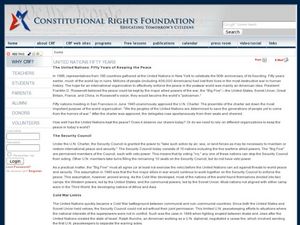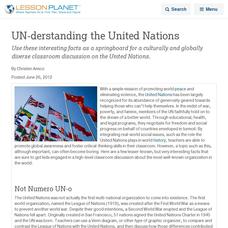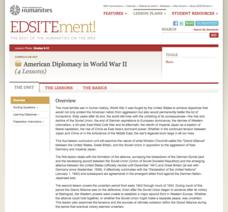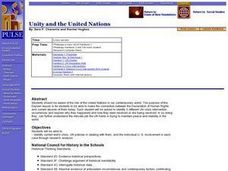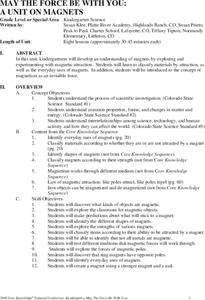Curated OER
The United Nations
What does the United Nations do? This highly informative presentation gives learners an overview of the types of jobs, policies, and functions of the UN. Note: This resource is text-heavy and would be most appropriate for children in...
Curated OER
The United Nations: Fifty Years of Keeping the Peace
Students examine the work of the United Nations. In this United Nations instructional activity, students listen to their instructor present a lecture regarding the history of the United Nations. Students respond to discussion...
Curated OER
United Nations: What It Does for Us
Fifth graders will understand what the United Nations Organization does and will be able to identify the aims and purposes of the United Nations. They recognize the seven key areas of the Millennium Declaration.
Close Up Foundation
Rights Auction
In an engaging activity on universal and unalienable rights, learners work in groups to establish a democratic nation and determine what principles they want to protect to ensure a democratic society. They conduct a "rights auction" in...
Curated OER
UN-derstanding the United Nations
Use these interesting facts as a springboard for a culturally and globally diverse classroom discussion on the United Nations.
Curated OER
Bring United Nations Day to School
Ideas to honor the mission of the 193-nation-strong organization that fosters peace, sustainability, and human rights around the world.
Curated OER
The United Nations
Students are introduced to the role of the United Nations. Using the internet, they research its history and its influence on politics and peace. In groups, they create a timeline of significant United Nations conventions since World...
National Endowment for the Humanities
American Diplocmacy in World War II
The end of World War II saw the world deeply changed over the last few years. Four thorough lessons explore post-war Europe, America, and Asia through reading assignments and discussion questions about the Grand Alliance and the signing...
Curated OER
A Lesson To Accompany "The First Bank of the United States: A Chapter in the History of Central Banking"
Here is an interesting topic. Learners examine the economics that led to the founding of the First Bank of America. They participate in a reader's theater experience depicting the debate between Alexander Hamilton and Thomas Jefferson...
Curated OER
Unity and the United Nations
High schoolers identify current world crisis. They explore UN policies in dealing with them. Students access the individual U.S, involvement in each case through research analysis. They become aware of the role of the United Nations in...
Channel Islands Film
A Time Capsule of a Lost Early California Lifestyle
After viewing The Last Roundup, a documentary that examines the transitioning of Santa Rosa from a privately owned island to a National Park, class members adopt the point of view of Tim Vail, a member of the family that once owned the...
Curated OER
Andrew Jackson vs. The National Bank
Students explore Andrew Jackson's vision for the National Bank. In this Jackson presidency lesson, students determine why Jackson vetoed the National Bank's Charter and indentify the causes of the Panic of 1837.
Curated OER
Should the United States Have a Central Bank?
Students assess the validity of a national bank. They study the importance of McCullough v. Maryland. They review the arguments of Hamilton and Jefferson. They analyze the Tenth Amendment and the debate over state v. federal power. They ...
Curated OER
Decolonization and Self-Determination
Students define and discuss colonialism and self-determination. After reading the European's view on the topic, they analyze a map of imperialism in 1914. They watch excerpts of a video and take notes on various United Nations...
Core Knowledge Foundation
Genetics and the Master Race
How did the beginnings of genetic research influence the Nazi party? A thorough, engaging unit incorporates the work of Gregor Mendel, the study of inherited traits, and the use of racism and discrimination during the Holocaust.
Curated OER
The U.S. Constitution
Students explain the differences between the three branches of government. Using the structure of a democracy, they listen to text about the United States Constitution. They discover how their government affects their lives in negative...
Curated OER
Teaching Six Big Ideas in the Constitution
Students debate the constitutional principles of the United States. In this U.S. government lesson, students examine the meaning of the text of the U.S. Constitution and analyze other primary documents of the era. Students prepare for...
NPR
Civil Rights of Japanese-American Internees
Prompted by a viewing of Emiko and Chizu Omori’s Rabbit in the Moon, a documentary about the internment of Japanese-Americans during World War II, high schoolers examine a series of documents, including the Bill of Rights and the UN’s...
Curated OER
American Symbols and Figures
Students examine a variety of symbols important in American culture. They investigate the history of the Great Seal of the United States and the painting "The Spirit of 1776". They create an original seal and identify important monuments.
National Endowment for the Humanities
How "Grand" and "Allied" Was the Grand Alliance?
Learn more about the Grand Alliance with a scaffolded lesson plan that includes four activities. Class members use primary sources to complete a map exercise, understand the goals and objectives of each individual nation, and participate...
State Bar of Texas
McCullough v. Maryland
Can a state government tax the federal government? The Supreme Court case McCullough v. Maryland explores different governments in the United States. Scholars research the court's decision with a video and discussion. They formulate...
Curated OER
May the Force Be With You: A Unit on Magnets
Students uncover data about magnets and practice classifying them by amounts of attraction and magnetism as an invisible force is introduced. The unit presents the topic within eight lessons.
Curated OER
Building a Nation
Eighth graders identify the main ideas of the U.S. Declaration of Independence. They read and discuss text, read and summarize a section of the Declaration of Independence in small groups, and write a paper on why the colonists felt it...
Curated OER
The Constitutional Convention: Four Founding Fathers You May Never Have Met
Students study the biographies of Ellsworth, Hamilton, Paterson, and Randolph. They study roles of these men during the Constitutional Convention.



